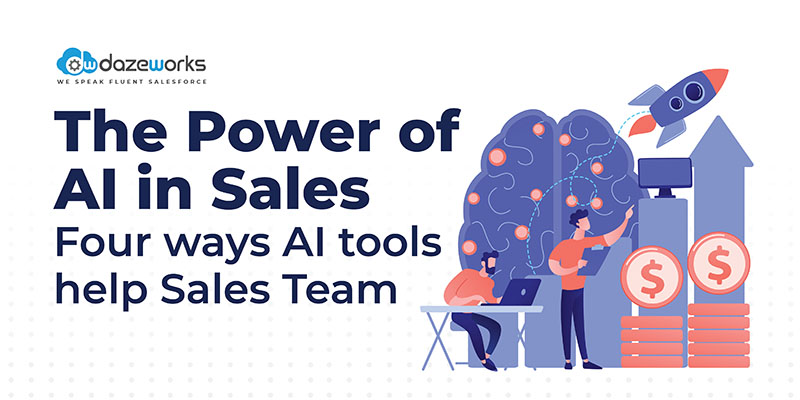
The Power of AI in Sales: 4 Ways AI tools helps Sales Teams
minutes read
Driving B2B sales is a daunting task especially with human interactions currently restricted to the remote work environment. In-person meetings, networking, and large scale events are now part of digital channels. And hence there is immense pressure on the sales team to level up their game. Even when the job market for sales roles in the US has shot up to 65% in the past year, so many are hesitant as they think it’s sometimes difficult to crack ‘unrealistic targets’. This is exactly why organizations need to adopt new tools that’s powered by AI insights to help sales leaders and their teams make better decisions while selling products and close more deals.
Based on a McKinsey research report, companies that have pioneered the use of AI in sales have seen benefits. These include an increase of more than 50% in leads and appointments, cost reductions of 40% to 60% and call time reductions of 60% to 70%. Here’s why we think sales leaders should befriend AI tools to build a high performing sales team.
#1 Build a Strong Pipeline
We’ve seen sales reps struggle without a well targeted list and end up getting rejected. AI tools leverage data insights from various sources to guide and nurture your sales pipeline. It analyzes the history of lead occurrences, like who became a customer and who didn’t and uses that information to generate accurate lead scores. These lead scores give a fair understanding of which lead will convert and which will not. This in turn increases the overall productivity of sales reps as they can prioritize their calls on actual leads that have a good chance to convert.
It is important to understand which segments or regions will respond well and which will be slow. You may witness complicated customer journeys and unorganized customer data flowing through various departments of your organization. AI tools are highly efficient in optimizing your digital customer journey map. Using AI capabilities will help you understand rapid market changes and guide you through the sales cycle.
#2 Focus on the Right Opportunities
A sales team chasing every prospect customer without understanding their possible win rate is like shooting in the dark. An AI tool like Einstein Opportunity Insights calculates a score for every opportunity which determines the likelihood of the deal to close. Using an AI tool will help you get all the updates regarding your opportunity and make an advancement when the time is right.
#3 Automates Data Capture and Saves time
Sales reps, while their job is to make actual connections can sometimes get bogged down with day to day activities. Think about this. Searching through Outlook or Gmail for the last email from a contact or browsing through countless folders for each and every customer is alright, if it’s just a one hour job. But doing this over and over again for the rest of their day makes no sense anymore. At the same time, you cannot avoid these procedures as it is crucial in collecting customer data. When you give them an AI tool, say, Salesforce’s Einstein Activity Capture, it frees up their time by automating data capture which includes both structured and unstructured data such as emails, events, MOMs etc. This tool for instance links your calendar and an email to Salesforce and imports related data in to Salesforce. So when your sales rep is following up a pipeline, not only do they save time, but now they have real time data from their previous conversations to keep the sales cycle active.
#4 Accurate Forecasting Results
Many sales teams aren’t the best at forecasting. According to SiriusDecisions research, 79 % of sales organizations miss their sales forecast by more than 10%. But with AI, it makes it easier for sales leaders to improve forecasting accuracy and make smarter decisions. There is no room for guesswork anymore as AI tools bring in actionable insights using actual data such as the sales team performance in the previous year, missed opportunities, success rates and so on to create a sales forecast.
Einstein Forecasting is a great example to quote here given it’s bang on sales predictions that are based on real time insights. As these AI capabilities are infused into their Salesforce platform, the sales team can access this information from the dashboard and put it to good use while predicting the next forecast cycle.
If you think driving your sales team to achieve those ideal milestones is a hectic task, you are absolutely right. To make things easier, you can start by selecting a CRM that has extensive capabilities in the AI domain. Salesforce as a CRM has evolved around the growing customer expectations and has brought in several AI infused tools to make the sales team more efficient. Recently they introduced revenue optimization tools which combine the capabilities of Sales Cloud, Einstein, and Tableau to provide insights for sales leaders to build better pipelines and predict accurate forecasting. You can check out more about these new features here.
These are the 4 Ways AI tools helps Sales Teams. Want more insights on driving an AI powered sales team? Drop us a message here to talk to our team of experts.
Reference:
https://www.salesforce.com/ap/blog/2020/11/how-ai-is-transforming-sales.html
